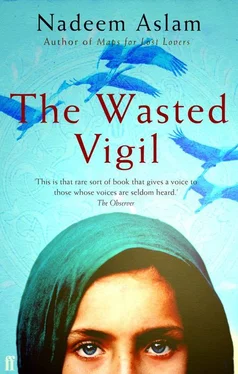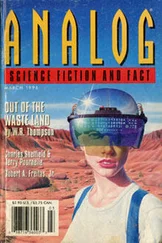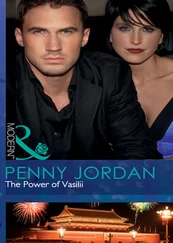Nadeem Aslam - The Wasted Vigil
Здесь есть возможность читать онлайн «Nadeem Aslam - The Wasted Vigil» весь текст электронной книги совершенно бесплатно (целиком полную версию без сокращений). В некоторых случаях можно слушать аудио, скачать через торрент в формате fb2 и присутствует краткое содержание. Год выпуска: 2009, Издательство: Faber and Faber, Жанр: Современная проза, на английском языке. Описание произведения, (предисловие) а так же отзывы посетителей доступны на портале библиотеки ЛибКат.
- Название:The Wasted Vigil
- Автор:
- Издательство:Faber and Faber
- Жанр:
- Год:2009
- ISBN:нет данных
- Рейтинг книги:4 / 5. Голосов: 1
-
Избранное:Добавить в избранное
- Отзывы:
-
Ваша оценка:
- 80
- 1
- 2
- 3
- 4
- 5
The Wasted Vigil: краткое содержание, описание и аннотация
Предлагаем к чтению аннотацию, описание, краткое содержание или предисловие (зависит от того, что написал сам автор книги «The Wasted Vigil»). Если вы не нашли необходимую информацию о книге — напишите в комментариях, мы постараемся отыскать её.
The Wasted Vigil — читать онлайн бесплатно полную книгу (весь текст) целиком
Ниже представлен текст книги, разбитый по страницам. Система сохранения места последней прочитанной страницы, позволяет с удобством читать онлайн бесплатно книгу «The Wasted Vigil», без необходимости каждый раз заново искать на чём Вы остановились. Поставьте закладку, и сможете в любой момент перейти на страницу, на которой закончили чтение.
Интервал:
Закладка:
A BREEZE comes along the migratory route of birds and enters the orchard. The Buddha’s head slowly rises off the floor in the perfume factory, the first movement it has known for several centuries.
The knitted harness of chains, almost a net, lifts it through the gap in the glass roof and brings it out into the September sunlight, the avenue of Persian lilacs — the chinaberries — thrashing in the wind that is being generated by the aircraft’s two mighty sets of rotor blades. In March there had been flowers but none of them remain, so only the foliage and the clusters of green berries are being dismantled onto the Buddha.
The stone face hangs from the twin-rotored military helicopter. As they hover and then move sideways and gain in height, Marcus looks down and catches glimpses of the head. The features smiling above the suddenly visible vista. His own body — the portion of earthly dust assigned him — feels insubstantial in comparison with all this. The soldiers have strapped him to the metal wall beside a window though they themselves know how to move with confident safety within the hulking machine. The mountains and hills rise and fall on either side of them. Sometimes the shadow of the flying machine is tiny — moving like a gnat along the floor of a deep valley — but at other times it is almost life-size, projected onto the side of a mountain that has suddenly appeared beside them.
‘Do you live alone?’ one of the soldiers had asked Marcus.
His family and friends are gone. He is alive but has been buried in many graves.
A letter came from Lara in July. The fragments of painted plaster she arranged on the floor in the golden room are still there. Looking at the mosaic after she went back to St Petersburg, he realised that one piece was missing, the piece on which the faces of the two lovers made contact. She had taken it with her to Russia. That and one of the perforated books. A kinship of wounds. It was The Golden Fleece picked at random. The dead may speak the truth only, even when it discredits themselves.
Rivers and small bright lakes pass under them — pale-yellow light held together by water. Some of the hills down there are dotted with red: the rocks have been daubed to warn that the vicinity hasn’t yet been cleared of landmines.
Marcus and Qatrina had informed the National Museum at Kabul when the head was discovered during the building of the perfume factory decades ago, and they had attempted to take it away but hadn’t managed it. In the end Marcus’s house was officially designated an annexe of Kabul Museum, a dozen or so visitors managing to make it to the house every year to see the colossal Gandhara sculpture. During this summer Marcus has persuaded the Museum to make another attempt to transport the statue to Kabul, most of the priceless collection once housed there having disappeared or been smashed during the wars.
He can see a shepherd resting under a tree in the plains below. His animals have spread themselves out in such a way that they form a living imprint of the tree on the ground, making maximum use of its shadow.
From the folds of one of the hills in the next valley a rocket is fired at the aircraft.
Marcus watches it climb, almost in staggered time, incrementally. Its low speed seems unconnected with the massive tail of white smoke issuing from its rear, hinting at its great weight, at the effort involved in raising it — the many deaths it contains. Then another comes, both of them missing the target.
The American boys around him lower the Buddha onto a low hill, and he too alights. The metal bird rising and veering away to investigate, the soldiers telling him they’d prefer it if he weren’t with them. He watches them disappear towards the possibility of a battle.
He is alone with the smile. Suddenly now it feels perishable, hard stone though it is, without the protecting walls of his perfume factory. He can see all around him, the arid dusty plains, the walls of green or blue but mostly khaki hills, the mountains beyond, and he can hear the sounds of a skirmish from the other side of the nearest hill. He sits in the shade cast by the statue head, his back leaning against the chin, his ear next to the mouth.
The school has remained shut since Dunia’s disappearance but it’s reopening soon.
‘Majrooh?’
A man had approached him last week and called him by the name he had taken to be able to marry Qatrina.
‘You won’t recognise me, sir, but when I was much younger I used to come to your house to borrow books. Your daughter and I …’
Marcus nodded and, encouraged, the man took a step towards him.
‘I have come back to Usha to take over the school.’ He smiled, and pointing to his motorbike on the other side of the street — a child with an artificial leg was sitting on the back seat — he added, ‘I was riding past just now and thought I recognised you …’
Marcus sets out in search of water, finding a patch of dampness at the base of a hill and knowing how to use the very tips of his fingers to gently persuade the spring to come out into daylight. The water quivers in the curved palm of his hand, as frightened as a small captured lizard. Nabi Khan’s raid on Usha had been unsuccessful but he has promised another in a recent shabnama . That day American soldiers engaged in a fire fight near by had got involved and had requested aerial assistance, the giant bombers arriving like lions roaring in the sky. Making the earth shake as they dropped bombs from above. Afghan officials speculate that conservative Saudi Arabians, as well as certain rogue elements within the Pakistani government and military, are financing the attacks. Pull a thread here and you’ll find it’s attached to the rest of the world.
The human eye is trained to look for symmetry, so the fact that someone has a missing limb is obvious. Seventeen ordinary citizens of Usha died in the battle that morning in March, and twelve people — including James Palantine — lost their legs or arms. Ringing from Western countries, families and lovers always ask the soldiers about their limbs first, about their hands and feet.
He comes back to the statue and waits.
The stars — one for each life lost during the wars of the previous decades — are out by the time the young men come and lift him out of the landscape. A deep indigo evening. Half a moon with a coloured halo. There is an up-pouring of glow from the land as though in response to the moonlight.
The Buddha is lowered in the grassy field beside the Museum, the building now secured by the British Army. There are three tonnes of Afghan antiquities in a warehouse near Heathrow, reliefs, bowls and sculptures that were illegally removed from Afghanistan at the behest of various warlords and chieftains, waiting to be brought back to these impoverished galleries.
Near by are the two ruined horse carriages once used by the royal family, the insignia and medallions still bright on the otherwise weather-beaten sides and doors of the larger carriage. The six-petalled moulded flower at the very hub of the wheels is surrounded by the words PETERS & SONS LONDON arranged in a circle.
A few hours of sleep later, he looks out from the window of the room he has been given inside the museum but he cannot see the stone face.
A dawn made of mist.
When sunlight appears and the soldiers allow him out he walks through the lit haze, feeling his way towards it. He stands looking at the giant lips as though waiting for the answer to a question. Apollo, the lord whose oracle is at Delphi, who neither speaks nor keeps silent but offers hints.
He enters the building and asks if someone would be kind enough to take him to the city centre in a while. He is meeting someone there who could be Zameen’s son.
Читать дальшеИнтервал:
Закладка:
Похожие книги на «The Wasted Vigil»
Представляем Вашему вниманию похожие книги на «The Wasted Vigil» списком для выбора. Мы отобрали схожую по названию и смыслу литературу в надежде предоставить читателям больше вариантов отыскать новые, интересные, ещё непрочитанные произведения.
Обсуждение, отзывы о книге «The Wasted Vigil» и просто собственные мнения читателей. Оставьте ваши комментарии, напишите, что Вы думаете о произведении, его смысле или главных героях. Укажите что конкретно понравилось, а что нет, и почему Вы так считаете.












